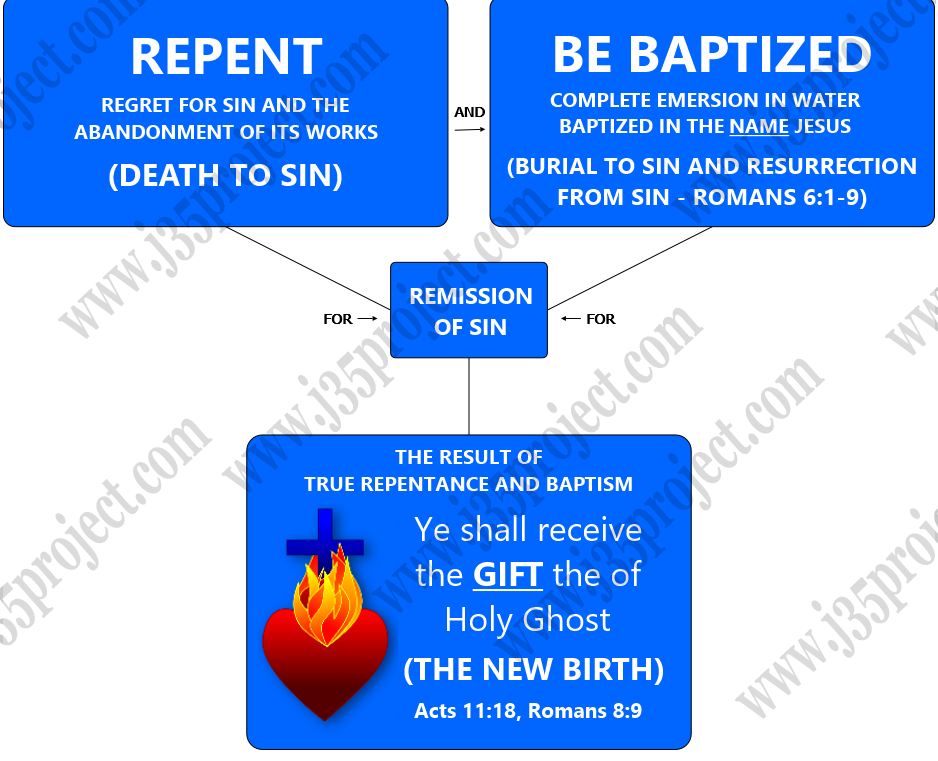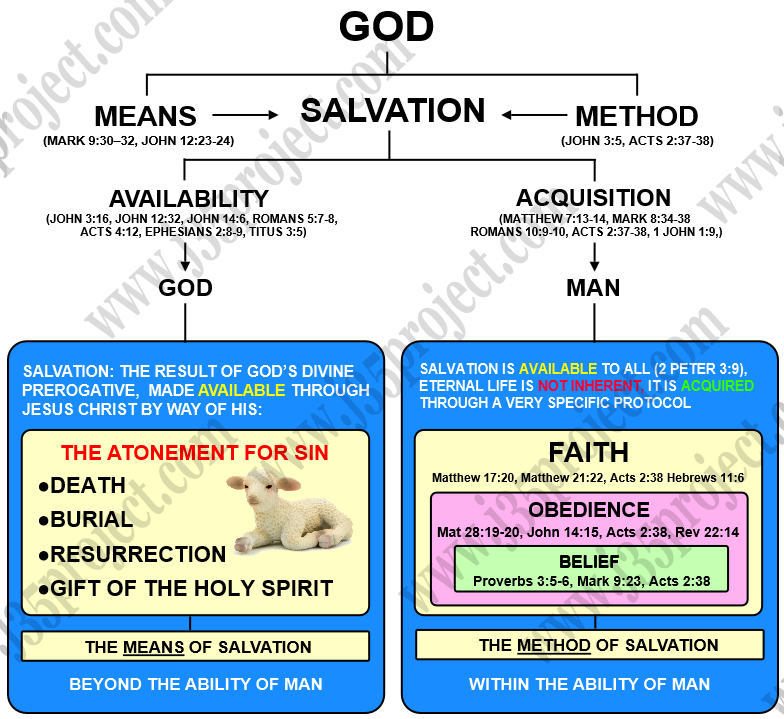Is Baptsim Necessary For Salvation?
Author: Kenneth LongPosted: Monday, January 25, 2022
Part 3 - The Obligatory Nature of Baptism
-
-
The Apostle Peter Explicitly Commanded Water Baptism.
-
Acts 2:38 - Then Peter said unto them, Repent, " AND "be baptized every one of you in the name of Jesus Christ "FOR" the remission of sins, and ye shall receive the gift of the Holy Ghost.
Here in Acts 2:38, the directive of Jesus Christ (Matthew 28:19-20) for baptism is parroted by the apostle Peter. In his address to the men gathered outside of the prayer meeting on the day of Pentecost, Peter delivers a scathing indictment of his Jewish brothers for rejecting and killing the messiah. In the sting of guilt and conviction, the murmurs of remorse began to permeate the crowd culminating in the plea "Men and brethren, "what shall we DO?" ; to which Peter responds;

Peter commands repentance and water baptism Salvation is realized ONLY through the new birth; the infilling of the Holy Spirit (Acts 2:4, Acts 10:44-48, Act:11:14-18, 1 Corinthians 12:13, 1 Thessalonians 5:9-10, Romans 8:11). We read in Romans:
Romans 8:9 But ye are not in the flesh, but in the Spirit, "IF" so be that the Spirit of God dwell in you [literally]. Now if any man have NOT the Spirit of Christ, he is NONE of his.In looking back on the words of Peter in Acts 2:38, we see that receiving the new birth (the literal infilling of the Holy Spirit) is predicated on BOTH repentance, a turning from sin (death to sin – Galatians 5:24) AND water baptism (burial to sin and resurrection from sin – Romans 6:1-9) . Both repentance and water baptism are implementations of faith (John 14:15, James 2:26)). It is necessary to state that God has provided both the means and the method of salvation as a matter of divine prerogative. As a result, salvation belongs ENTIRELY to God; despite man being its sole beneficiary; as "he" (God) is the architect AND orchestrator of salvation.
Ephesians 2:8-9 For by grace are ye saved through faith; and that not of yourselves: it is the gift of God: Not of works, lest any man should boast.Through grace, Jesus made available the opportunity to "regain" the eternal existence forfeited by Adam. As his descendants, we are incapable of extracting ourselves from the degenerate nature imposed on us through Adam. The requirements and the resources necessary to remediate our corrupt nature is simply beyond our capability. The opportunity to be restored to a state of holiness, in harmony with God, is a "gift", an undeserved provision of restoration. Although salvation is made available to all, salvation is not without "acquiescence" OR "allocution" (a statement of remorse in seeking mitigation of a sentence from a judge). We must acknowledge before our judge, Christ, that we are afoul of his laws, and seek clemency. God's provision of "clemency" (forgiveness of sin) and the opportunity for eternal life highlights the dichotomous nature of salvation.

The Dichotomy of salvation. God provided the path to eternal life. Mankind must walk that path (Matthew 7:13-14 , Mark 8:34) God is the architect of redemption; from the provision of atonement to the new birth in man; it is all "his" work. However, the fact that redemption has come to all, it does not override the will of an individual to "accept" or to submit to the redemptive work of Jesus Christ (Matthew 7:13-14).
Finding redemption in Jesus Christ requires deliberate action. Salvation is BY GRACE (God's divine prerogative) through faith. However, biblical "faith" must flower into "action." Action is the authentication of belief and trust in God. Faith "acts", "repentance" is an "act", water baptism (both the administering and the submission to it) is an "act"; there can be no new birth without repentance (1 John 1:9, 2 Corinthians 7:10) and no remission of sin without water baptism (Romans 6, Acts 2:38, Acts 22:16).
The fact is, faith is NOT exclusive of what we "DO:" our "ACTIONS" ARE the basis and the verification of our belief and trust in God. Biblical faith is realized through an affirmative "response" to God's will; that response is not simply cognitive, as "belief only" proponents suggest. While there is a cognitive component through acknowledging God's will, our acknowledgement should result in consent (submission); an action. Giving God permission to act on us, beit healing, deliverance, or facilitating our transition from sin to holiness is ALWAYS effectuated through what we "DO" in response to God. This does not suggest that what we "do" according to our will or desire "is faith" or a demonstration of "trust" in God.
"Biblical" faith actively operates within a specific framework outlined by God in his word. "His" commands, "His" instructions, "His" requests, are the means by which we function and ultimately thrive in God and righteousness. Jesus said in:
John 14:15 If you love me ye will KEEP my commandments."Our love for God, and thereby our trust in God is evinced through what we "DO". "Biblical" faith is accomplished through servile compliance. To reiterate, there is no salvation apart from receiving the infilling of the Holy Spirit; none. The Holy Spirit "is" God's seal of ownership of the born again (Ephesians 1:13). That seal is not a "declaration of belief" followed by an assertion of salvation, but the "literal" experience of receiving the spirit of God (John 7:38-39, Act 2:2-5, Acts 11:12-18, Acts 19:1-6 - see The Properties of Salvation ) through the new birth." We read in:
Acts 5:32 And we are his witnesses of these things; and so is also the Holy Ghost, whom God hath "given to" them that obey him.
-
-
Ananias Commands To Paul To Be Baptized
We see once again the compulsory nature and "functional purpose" of water baptism as it relates to sin. In recounting his conversion, Paul restates the words of Ananias after communicating Paul's calling. In his concluding words to Paul, Ananias commands Paul to be baptize and states, the "purpose" of baptism. He states:
As Peter did in Acts 2:38, Ananias identifies water baptism as the means of removing sin. It is important to restate, neither water baptism nor repentance would be of any benefit but for God being willing to accept atonement for the sins of man. However, making atonement for man through the blood of his son Jesus the Christ DID NOT remove sin from the unrepentant (Romans 3:23, 1 John 1:8–10, 2 Peter 3:9). The death of Jesus on the cross; provided the means of salvation. The method of salvation, the acknowledgment, abandonment, and the washing away of sin, only man can provide. This does not negate the fact that it is God that equips man to abandon sin (through prayer, fasting and applying his word), but God cannot abandon sin "for" an individual.Acts 22:16 And now why tarriest thou? arise, and be baptized, and wash away thy sins, calling on the name of the Lord.
-